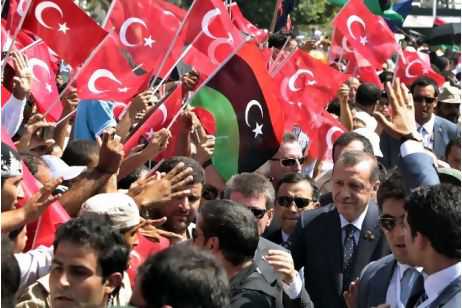Tom Arnold

Turkey has staked a claim in the rebuilding of Arab Spring economies, signing a flurry of lucrative contracts and seeking to secure multibillion dollars of deals.
The country’s bid for a leading role in reconstruction efforts in Libya, Egypt and Tunisia could prove crucial as advanced economies remain distracted by the twin concerns of slowing economic growth and sovereign debt, say analysts.
“From a regional perspective it makes perfect sense for Turkey to increase its ties with the Arab world as in the medium term there are bright prospects in the region in terms of growth and booming markets and after the Arab Spring optimism is even higher,” said Turker Hamzaoglu, an economist for Eastern Europe, Middle East and Africa at Bank of America Merrill Lynch.
Turkey’s prime minister Recep Tayyip Erdogan and scores of businessmen from the country visited Egypt, Tunisia and Libya last week. The aim was to cement new political and commercial ties with post-revolution regimes in the three countries.
Turkey signed agreements with Egypt to cooperate on a wide range of issues from technology to energy and pledged to raise trade from the existing level of US$3.7 billion (Dh13.5bn) to $10bn.
In Libya, Turkey said it planned to resume work on six Libyan oil wells on October 1 and also offered to build a new parliament as well as restore schools, police stations and judiciary buildings.
But the trip was about securing existing interests too. At stake is $18.5bn worth of contracts Turkish companies were involved with in Libya that have remained suspended since the civil war flared nearly seven months ago.
Sitting on the apron of the Middle East, Turkey has a long history of commercial ties with the region. In recent times these links have accelerated as Turkey has emerged as a rising economic power.
Turkish contractors helped to build infrastructure projects such as the Dubai Metro and Cairo’s latest airport terminal.
The region has also emerged as a key export market for a range of products from baklava to soap operas. Middle East and North Africa markets account for more than a quarter of Turkey’s exports, up from 17 per cent five years ago.
At least some of Turkey’s business has been threatened by unrest that has fanned across pockets of the region since December.
Like other export-led economies, Turkey has been hit by the disruption to trade caused by the turmoil.
Exports to Egypt have slid by almost 80 per cent in the first eight months compared with the same period last year. Trade with Libya has fallen to $550 million in the first seven months of this year, down from about $1.5bn in the same period last year. Exports to Tunisia have also declined.
While the trip was about seeking ways to rebound trade, the timing was also a reflection of the risk facing Turkey’s export-reliant model, said David Butter, the Middle East editor at the Economist Intelligence Unit.
“Now the environment is much more tricky,” he said. “The Syrian export market is likely to be effected by the violence there and the prospects in Europe are not so bight.”
A tightening crackdown on protesters by the Syrian president Bashar Al Assad since April has put at risk rising one-way trade with the country.
As much as $1bn of exports went to Syria in the first half of the year. The country also acted as a road route for Turkish lorries to transport goods onwards to the Gulf.
In Europe, a sovereign debt impasse is clouding the outlook of commerce with Turkey’s main trading partner. Nearly half of Turkish goods are consumed in the EU.
Turkey, meanwhile, has also announced a suspension of trade ties with Israel.
In the first half of the year, Turkey posted a $2m trade surplus with Israel. Mr Erdogan said this month that his country was suspending all trade, military and defence industry ties with Israel, reflecting worsening relations between the countries.
via Turkey seeks billions in post Arab Spring deals – The National.

Leave a Reply